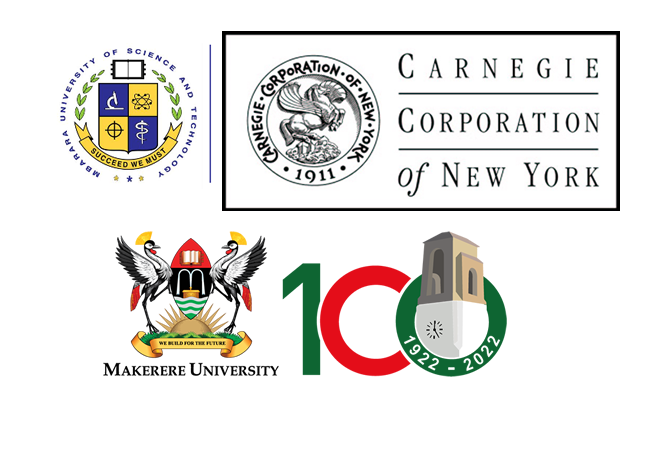CONSOLIDATING EARLY-CAREER ACADEMICS PROGRAMME (CECAP)
MASTER OF SCIENCE SCHOLARSHIP
Call for Applications
Background
The Department of Biology has attained funding from Carnegie Corporation of New York through Makerere University under the Consolidating Early-Career Academics Program for two postdoctoral research fellowships. The grant is aimed at consolidating the research capacity of early career academics to enhance their research productivity and ability to contribute effectively to the generation of global scientific knowledge. One of the main activities under this program is mentorship and supervision of postgraduate students by the postdoctoral fellows. The department is therefore looking for two MSc students registered at MUST to work directly under the supervision of the post-doctoral fellows on the following projects:
Project 1: Assessment of the Medicinal Potential of Ferns in Combating Antimicrobial Resistance (AMFAR)- [Project PI-Dr. Rapheal Wangalwa]
Antimicrobial resistance is a drain on the global economy, resulting in lost output as a result of illness (in humans and animals) and higher treatment expenses (McGowan, 2001). In this regard, the global action plan on antimicrobial resistance underscores the need to manage the antimicrobial resistance crisis with the utmost urgency. As such, more innovation and investment are needed in operational research, as well as in the research and development of novel antimicrobial drugs, particularly for resistant bacterial strains. Plants have played a central role in the quest for new antimicrobial agents and other drug developments. Several studies on empirical evidence of antimicrobial studies have largely focused on higher plants while neglecting lower plants, ferns inclusive. Ferns are lower vascular nonflowering plants belonging to division Filicinophyta (Rahmad & Akomolafe, 2018). They are mostly found in damp, moist, and shady areas. For instance, in Uganda, ferns mainly occur in tropical rain forests (Mucunguzi, 2007). It is worth noting that the diversity and distribution of ferns in Uganda are largely unexplored yet ferns are reported to possess diverse ethnopharmacological properties. They have reportedly been used in traditional medicinal practices in many African countries (Ukwubile et al., 2019). However, empirical evidence on the efficacy and bioactivity of ferns is still limited especially on Uganda’s fern species. This project, therefore, seeks to determine the diversity and distribution of ferns in tropical forests of southwestern Uganda and explore their antimicrobial potential, especially on drug-resistant bacterial and fungal strains with a view of developing new antimicrobial agents.
Project 2: Establishing Long-Term Community Water Monitoring System for River Rwizi Catchment Using Digital and Bioblitz-Citizen Science Approaches [Project PI-Dr. Jeninah Atwebembeire]
River Rwizi is the major source of water for Southwestern Uganda. Studies have been done over a small area of the river Rwizi, predominantly around the urban catchment of Mbarara City leaving most of the rural catchment relatively unstudied. These studies have mainly focused on the physical-chemical status of the river ecosystem showing high degradation of the catchment and unacceptably high levels of dissolved nutrient loads and other pollutants from urban waste (Atwebembeire et al., 2018; Lukubye and Andama, 2017). The high nutrient load of R. Rwizi has resulted in the proliferation of the water hyacinth (Eichhornia crassipes) which thrives in highly eutrophic aquatic systems (Balirwa et al., 2009). Poor waste management together with lack of water treatment facilities has led to selective increase of antibiotic-resistant bacteria and the observed increase in the occurrence of multidrug-resistant organisms (Mulamattathil et al., 2014; Atwebembeire et al.; 2022). Currently, there is scanty ecological data available on microbial and macrobenthic indicators of pollution of R. Rwizi watershed and how they relate with Spatio-temporal variation of Physico-chemical parameters of R. Rwizi. Additionally, there is limited human and technical capacity to study and manage most of these important aspects of the R. Rwizi system. This study, therefore, seeks to create a comprehensive long-term information system on the entire R. Rwizi catchment area using physicochemical, benthic macro-invertebrate, and bacteriological parameters and indicators to address the major socio-ecological gap identified in our previous studies. This study will also engage local citizens who are the beneficiaries and polluters of river Rwizi and its catchment in socio-ecological data collection methods that will be done using a simple digital tool customized for rapid surveys (bio-blitz approach).
Selection Criteria
- The call is open to students registered for a Master of Science program in a relevant field at MUST.
- The applicant must have completed their coursework year and ready to embark on the second year of their Master’s course.
- The applicant should be progressing normally with the current MSc program.
- Preference will be given to applicants with a relevant BSc background (Biology, Microbiology, Environmental Science, or any related field).
- The applicant must be ready to work very hard to complete the Master’s program within one year including a publication
- Female candidates are strongly encouraged to apply.
Scholarship Offer
The scholarship covers all research costs and tuition fees for one year at MUST to a tune of 2500USD per student. The scholarship funding will be compliant with the official scholarship schemes of the CECAP program. Successful applicants will work under the direct supervision of Dr. Rapheal Wangalwa (PI-Project 1) and Dr. Jeninah Atwebembeire (PI-Project 2); and mentorship of Dr. Grace Kagoro.
Application Procedure
The application should include:
- A concept (not more than 5 pages) is mandatory. The Concept note must include a title for the proposed study, brief background highlighting key literature, research problem, main research question(s)/objectives, methodology, and a list of key references.
- A CV (2 pages)
- Copies of academic degrees’ documents and transcript of records.
- Partial transcript or AIMS record of the course work year (First year)
- A statement of motivation – why you think you are the best candidate for the MSc position (1 page).
- A letter from an academic referee supporting your application
- The softcopy applications should be addressed (and submitted) to the Head department of Biology, Prof. Grace Kagoro (kgraceug2002@must.ac.ug ), and copied to (CC) Dr. Rapheal Wangalwa-PI Project 1 (wangarapha@must.ac.ug) and Dr. Jeninah Atwebembeire-PI-Project 2 (atwebembeirej@must.ac.ug )
All applications should be submitted by 10th October 2022, 5:00 pm.
Interviews
The selection process will involve two stages – a pre-selection phase between 11th and 13th October 2022. Pre-selected candidates will be contacted for an interview between 18th and 20th October 2022.

